"The dress you are wearing to look beautiful is made of our sweat and tears"
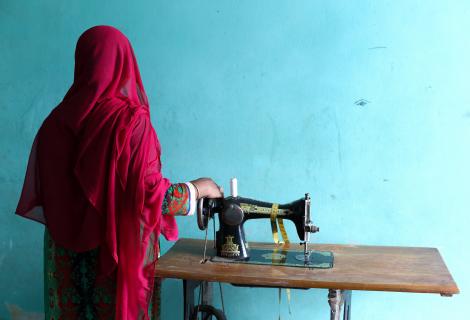
Women workers share their experiences of Bangladesh's garment industry
Nurjan, Salma and Rahima are just three of the many thousands of women working in Bangladesh's garment industry, making clothes exported to consumers around the world.
Nurjan, 26, has worked in the garment industry in Bangladesh’s capital Dhaka for nearly a decade. She works as a senior machine operator for an average of 60 hours a week (the UK average is around 40).
Her day starts at 5am, she cooks for herself and her family, and then starts work at 7am and stays until around 9-10pm.
“This is what my life looks like. I do not have any time for myself or for entertainment. At the weekend, I have household chores such as cleaning and laundry,” she says.
She got married at a very young age and is now separated from her husband. In an industry rife with power imbalances and where eight in 10 workers have experienced or witnessed sexual violence and harassment, she believes this has put her at greater risk of abuse.
“Because I am a single woman, my supervisor thought I was vulnerable and exposed. He used to touch me at work,” she says.
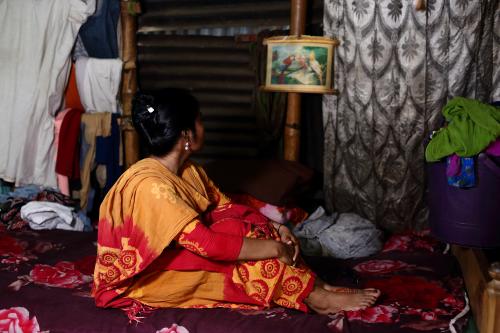
She shares frightening stories about line managers forcing her to stay late and repeatedly making inappropriate advances. She complained about them to senior management, but the men are still working at the factory.
Nurjan believes sexual harassment and violence is widespread in the garment industry: “Women are forced to get involved with their line managers because of the power gap. It is common for them to use their position to take undesirable and immoral advantages. If the women agree to the proposals, they receive favours.”
Attending a Workers’ Café, supported by ActionAid Bangladesh, has given her “moral strength” and taught her about labour laws and women’s rights. “I might not have degrees or certificates, but I am a self-taught person now,” she says.
Nurjan says she shared her experiences of sexual harassment with her colleagues to encourage them to speak out if they go through a similar situation.
Despite the indignities and abuse, Nurjan says she is proud to be part of the garment industry.
“I believe making clothes is an art. Because of this industry, a woman like me is still alive without any family support."
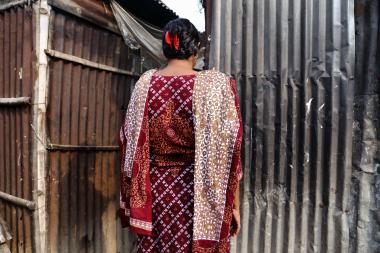
Fifteen years of working in the garment industry has left Salma suffering from severe back pain, which she can’t afford treatment or time off for, and dreaming of a better life for her children. Although just 38, she says back pain is “a common problem among most elderly workers".
"My plan is to buy land close to the city and build my own house there. I don’t want to live in the slum anymore,” says Salma, who lives in Bangladesh’s capital Dhaka with her husband and two sons. “I want my children to study and do something better. I do not want them to work in garments factories like me.”
Salma has experienced terrifying incidents of sexual violence, including an attempted rape. But she says she could not discuss these with her family, or they would not let her return to work. She says workers are usually asked to leave the factory if they raise issues of harassment with the management.
In a previous role, her manager repeatedly asked her to stay behind after work, but she refused. One morning when she was earlier than other workers, he violently attacked her, dragging her up two flights of stairs. “I thought I would have been raped. I never went back to that place again,” she says.
She says she didn’t know her rights before attending a Workers Café. She has since learnt about labour laws, maternity leave benefits and the right to work in a safe environment with access to clean drinking water. Salma says that now she would report any incidents of violence and harassment.

“I will protest now if anything happens. I will let the management know. If I do not get any justice from them, I will file a police complaint.”
She questions whether the people who buy the clothes she makes, know how little garment workers are paid and the conditions they face. “I do not even know if they are aware of our pathetic living conditions,” she says.
“I want to tell them that the dress you are wearing to look beautiful is made of our sweat and tears.” Salma says
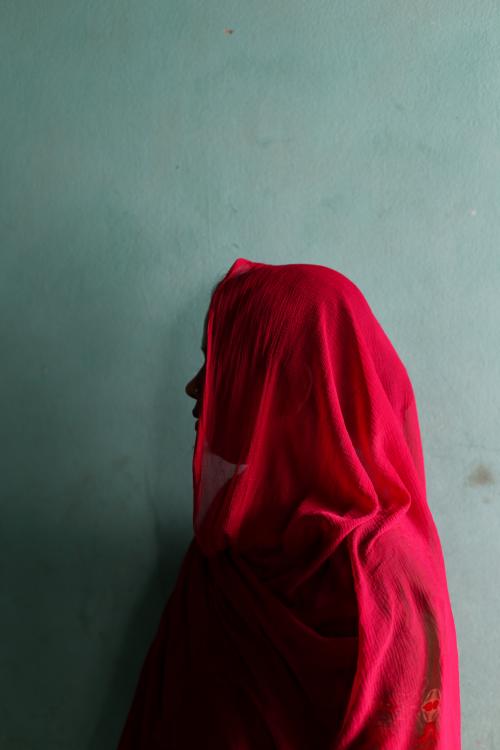
Rahima, 35, says feels fearful and tense while working as a machine operator in a garment factory in Bangladesh. She says her supervisor behaves badly towards her, especially during shipment times when the workload heavily increases. She describes one particularly terrifying experience when she was asked to stay late by a quality control worker. When she refused to go upstairs with him, he became aggressive.
“He became tremendously violent and threw a piece of plastic at me. It started bleeding over my head. I was very afraid by then. He didn’t stop and then forcefully tried to drag me upstairs,” she says. “I realised if I couldn’t save myself something terrible would happen to me. I kicked and punched him and started screaming loudly.”
Fortunately for Rahima, her husband, who had been waiting outside to pick her up, and the guard heard her screams and rushed in. Rahima says she feels nervous whenever she thinks about this incident. Her husband went with her to the factory the next day to talk to the manager. But her attacker was never reprimanded, and it was dismissed as an accident.
“They did nothing,” says Rahima, who left the job soon after the attack.
“I stayed at home for three years, I didn’t want to go back to any garment factory.”
She had to return to work, and she says attending a Workers’ Café helped her get her confident back.
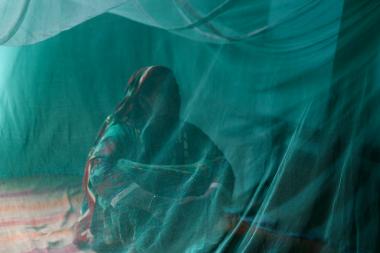
“If I had known more about my rights at the time, I could have brought justice for myself. Now I want to help other young women, so they never have to go through what I have faced,” she says. “Girls do not like to speak about it openly as they fear losing their jobs. It’s not only their job, they are concerned about their reputation, about their families. Many of the young girls are unmarried and they face harassment often,” she says.
Rahima adds: “If we can get a law [to end violence and harassment at work] and give girls justice, only then can the situation change.”
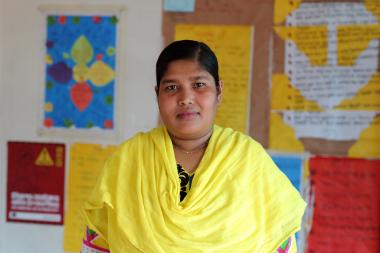
Nasima Akhter, manages Kalyanpur Café, Safety and Rights Society in Dhaka, which supports garment workers, mainly women, to understand labour law and their rights. The café provides advice, training and support on a range of issues, such as being paid the minimum wage, unfair dismissal and sexual violence and harassment. Nasima says women who attend the café feel more confident to challenge poor treatment at work:
“They are now more aware, sensitive and vocal about different issues. They recognise injustices and stand up for themselves and others. The workers are now pushing the factory management to be compliant with the laws and regulations.”
She says she hears about incidents of sexual violence and harassment about once or twice a month. “I would assume there are more such incidents, but women are not talking about it,” she says. “I have spoken with around 600 workers, mostly women. I would say I have heard stories of violence from around 150. Once a worker was bold enough to share an incident of rape with me. However, most workers are not comfortable to talk about such incidents.”
Nasima says that when women file complaints about sexual assault, they are often not taken seriously, and no action is taken against the abusers, who are usually in more senior management positions.
“Typically, their situation deteriorates after they complain. Most workers think the best option for them after an incident of sexual harassment is to quit,” she says.
Nasima believes that sexual harassment and violence are less common than in past because workers are more informed about their rights. But women workers continue to face other forms discrimination and are often forced to resign if they get pregnant or ask for a salary increase.
Salaries and working conditions continue to be key challenges for garment workers in Bangladesh, Nasima says: “Even after working hard, they still have to struggle to provide for themselves and their families. Saving for the future and hoping to offer a good life to their children are dreams that are too big for them to achieve.”
“The workers come to cafés to share stories that they cannot share with anyone else. They are safe spaces for them,” she adds.
ActionAid Bangladesh supports 25 workers cafés, including 17 in Dhaka and eight in Chittagong, funded by the European Union and provided by local partners.
Nurjan's, Salma's and Rahima's names have been changed to protect their identities.